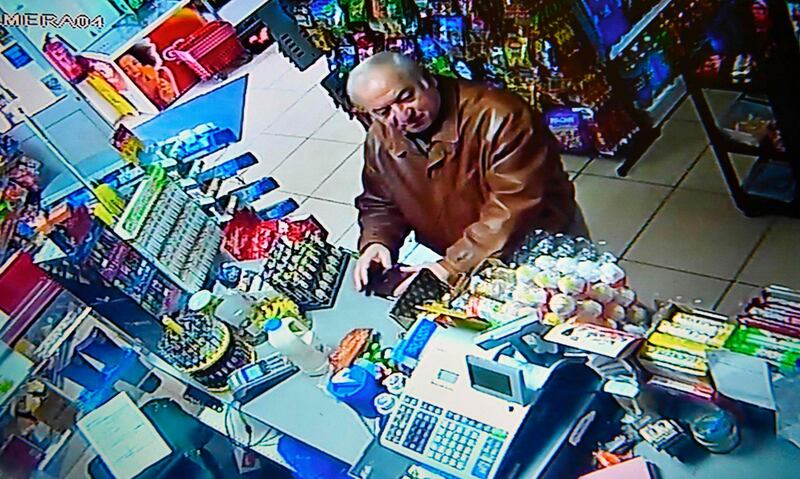Chemical experts from the British military have been called in to help police investigating the attempted murder of on a Russian double agent who remains critically ill in hospital five days after a nerve agent attack.
The military will help clear up the centre of the southern city of Salisbury, where areas remain cordoned off following the discovery of the stricken Russian, Sergei Skripal, 66, and his daughter Yulia on Sunday afternoon.
About 180 troops have been brought in to help remove vehicles and potentially-contaminated objects around the crime scene because of their specialist knowledge, said police.
The developments in the investigation came as Amber Rudd, the British home secretary, visited the city and was briefed by police and medical staff about the incident.
The UK is preparing retaliatory measures if it’s shown that Russia was responsible for the attack on Skripal who had settled in Salisbury, southern England after a spy swap in 2010.
Russia has denied being behind the attack, but a presenter on state television warned this week that ‘traitors’ that they should not settle in Britain or risk dying in “strange incidents”.
“The profession of a traitor is one of the most dangerous in the world,” the presenter, Kirill Kleymenov, said on Channel One's Vremya news programme.
"Something is wrong there. Maybe it's the climate, but in recent years there have been too many strange incidents with grave outcomes there."
The Skripals remain remain in a critical condition in hospital five days after the attack when they were found slumped on a bench at a shopping centre in the city, some 80 miles southwest of London.
Police officer Nick Bailey is also seriously ill after being one of the first people to treat the pair. “I understand it's still serious, although he's still conversing and engaging," said Ms Rudd.
Police said 21 people had been seen for medical treatment since the incident.
The use of a nerve agent – with its last known use in a targeted attack against the Kim Jong-nam, the estranged brother of North Korea’s leader – and Mr Skripal’s past have suggested that the Russian state was involved in the attack.
_____________
Read more:
[ British government urged to expel Russians over poisoning of former spy ]
[ Russian double agent stricken by nerve agent in targeted attack: police ]
_____________
Vladimir Putin, the president, made veiled threats against Russians who spied for foreign powers in 2010 and follows the murder of Alexander Litvinenko, using radioactive material slipped into his tea in 2006. A decade later a judge said the exile was ‘probably’ killed on the orders of Mr Putin.
The presenter referred to a series of events in which people were hanged, poisoned, died in helicopter crashes and fell out of windows. The comment appeared to refer to cases including Mr Litvinenko and the death of Boris Berezovsky, an influential Putin king-maker turned arch-enemy after criticising his former protégé and fleeing to Britain.
He was found hanged at his mansion in 2013 but police ruled out any link to state-sponsored assassination after he had been talking to his staff about killing himself, had lost most of his wealth, and had been depressed. Members of his family, however, blamed the Russian state for his death.
The British police and government have so far not publicly identified the suspect behind the attack but plans are being drawn up if the Kremlin is implicated in the attack.
They include diplomatic expulsions, the cancellation of visas for Kremlin-friendly Russians, asset freezes and travel bans as part of a “full spectrum” response, according to the Sun newspaper.
Longer term plans would include bolstering British military capabilities in Eastern Europe and lobbying NATO in July for further reinforcements, it said.
The expulsion of the Russian ambassador Alexander Yakovenko and known or suspected agents was an obvious first step despite the risks bilateral ties could go into a “deep freeze”, said Sir Christopher Meyer, a former British ambassador to Washington.
“You cannot tolerate a government assassination on British soil – it is absolutely beyond the pale and needs a reaction,” he said. “You could not only expel the ambassador but drain the swamp of all these guys that MI5 are tracking around London or wherever.”
Known as the spy with the Louis Vuitton bag, Mr Skripal was a KGB veteran who was convicted in Russia for spying for the British intelligence agency MI6 in 2006. He was handed over as part of a spy swap in 2010.
Police have cordoned off the graves of his wife and son, who died since his move to England, suggesting that the bodies could be disinterred for examination.
Those deaths plus the unexpected demise of one of his brothers in Russia have led to reports that the whole family was targeted by the Kremlin for attack.






